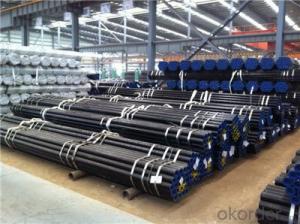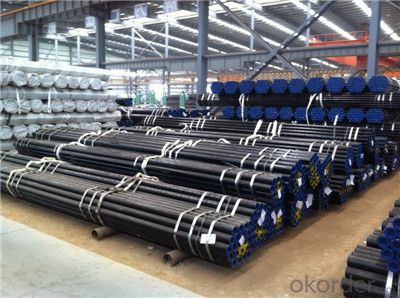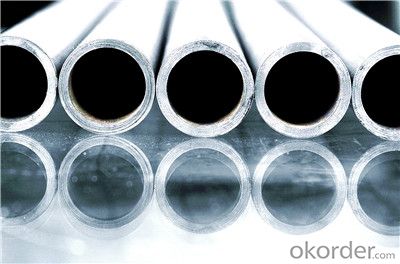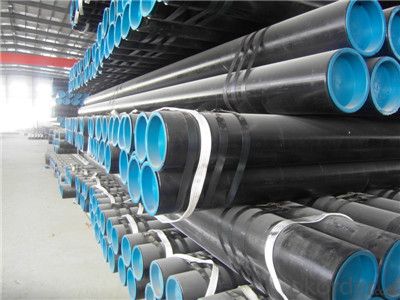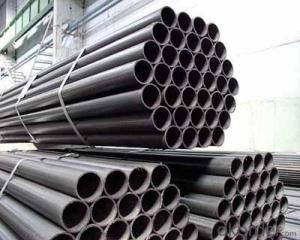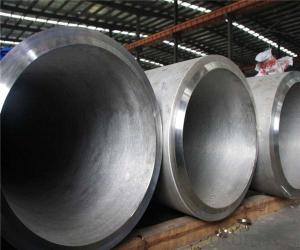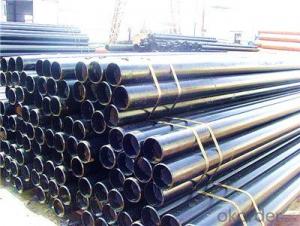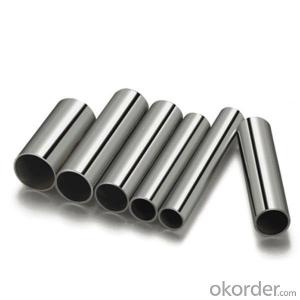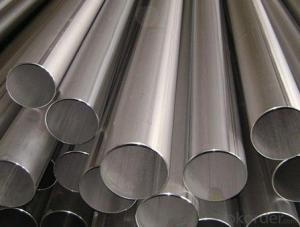CNBM seamless steel pipe with high quality
- Loading Port:
- Tianjin
- Payment Terms:
- TT OR LC
- Min Order Qty:
- 50 m
- Supply Capability:
- 200000 m/month
OKorder Service Pledge
OKorder Financial Service
You Might Also Like
PRODUCT DETAILS
1.Structure of Seamless Steel Pipe Description:
A large amount of Seamless Steel Pipes is offered to the clients at cost effective rates. These pipes are extremely durable, resistant to corrosion and have high tensile strength. Our pipes are used in nuclear plants, power plants, refineries and construction industry across the country. Furthermore, we are capable of providing these seamless pipes to the clients in bulk quantity.
2.Main Features of the Steel Pipe:
• High manufacturing accuracy
• High strength
• Small inertia resistance
• Strong heat dissipation ability
• Good visual effect
•Reasonable price
3.Packaging & Delivery:
| Packaging Details: | Seaworthy packages, bundles wrapped with strong steel strip |
| Delivery Detail: | 15-30 days after received 30% TT |
4.Seamless Steel Pipe Specification:
| Standard: | GB, DIN, ASTM,ASME, ASTM A106-2006, ASTM A53-2007 |
| Grade: | 10#,20#, 45#, 16Mn |
Thickness: | 8 - 33 mm |
| Section Shape: | Round |
| Outer Diameter: | 133 - 219 mm |
| Place of Origin: | Shandong, China (Mainland) |
| Secondary Or Not: | Non-secondary |
| Application: | Hydraulic Pipe |
| Technique: | Cold Drawn |
| Certification: | API |
| Surface Treatment: | factory state or painted black |
| Special Pipe: | API Pipe |
| Alloy Or Not: | Non-alloy |
| Length: | 5-12M |
| Outer Diameter: | 21.3-610mm |
5.Product pictures
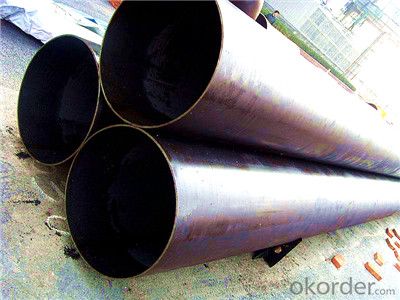
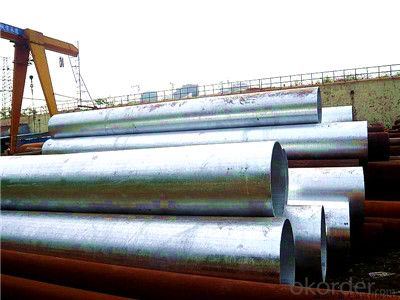
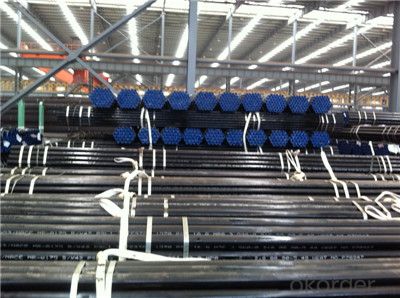
5.FAQ of Seamless steel pipe:
①How is the quality of your products?
Our products are manufactured strictly according to national and internaional standard, and we take a test
on every pipe before delivered out. If you want see our quality certifications and all kinds of testing report, please just ask us for it.
Guaranteed: If products’ quality don’t accord to discription as we give or the promise before you place order, we promise 100% refund.
②How about price?
Yes, we are factory and be able to give you lowest price below market one, and we have a policy that “ for saving time and absolutely honest business attitude, we quote as lowest as possible for any customer, and discount can be given according to quantity”,if you like bargain and factory price is not low enough as you think, just don’t waste your time.Please trust the quotation we would give you, it is professional one.
③Why should you chose us?
Chose happens because of quality, then price, We can give you both.Additionally, we can also offer professional products inquiry, products knowledge train(for agents), smooth goods delivery, exellent customer solution proposals.Our service formula: good quality+good price+good service=customer’s trust.
SGS test is available, customer inspection before shipping is welcome, third party inspection is no problem.
Any question, pls feel free to contact us !
- Q: How do you select the right size of steel pipe for a project?
- To select the right size of steel pipe for a project, it is important to consider factors such as the desired flow rate, pressure requirements, fluid type, and the overall structural design. Consulting relevant design codes and standards, performing calculations based on these parameters, and seeking expert advice can help ensure the appropriate size is chosen to meet the project's specific needs.
- Q: How do steel pipes handle vibrations?
- Steel pipes are known for their ability to handle vibrations effectively. Due to their strong and rigid nature, steel pipes can withstand various types of vibrations, including mechanical vibrations and seismic activities. The resilience of steel pipes is attributed to their structural integrity and strength. Steel pipes have high tensile strength, which enables them to resist deformation or breakage when subjected to vibrations. They are also resistant to fatigue, meaning they can endure repeated vibrations without experiencing any significant damage. This makes steel pipes ideal for applications that involve constant or cyclic vibrations, such as in industrial settings or for transportation of fluids through pipelines. Moreover, steel pipes have the advantage of being able to dampen vibrations due to their mass. The weight of the steel pipe helps absorb and dissipate the energy produced by vibrations, preventing excessive movement or oscillation. This damping effect contributes to the overall stability and durability of the pipe system. To further enhance the ability of steel pipes to handle vibrations, various measures can be taken. These may include the use of vibration isolators or dampers, which are devices designed to reduce the transmission of vibrations from the surrounding environment. Additionally, proper installation techniques and regular maintenance can help ensure that steel pipes continue to perform optimally under vibration-prone conditions. In summary, steel pipes are well-suited to handle vibrations due to their strength, resistance to fatigue, and ability to dampen vibrations. Their robustness and durability make them a reliable choice for applications where vibrations are a concern, ensuring the safe and efficient transport of fluids or materials.
- Q: What are the different types of steel pipe reducers?
- There are several different types of steel pipe reducers that are commonly used in various industrial applications. These reducers are designed to connect pipes of different sizes, allowing for a smooth transition in the flow of fluids or gases. Here are some of the most common types: 1. Concentric Reducers: These reducers have a symmetrical design with a centerline that aligns with the centerline of both the larger and smaller pipes. They provide a gradual reduction in pipe size, ensuring a smooth flow of material. 2. Eccentric Reducers: Unlike concentric reducers, eccentric reducers have an offset centerline. This design is useful when there is a need to prevent the accumulation of air or gases in the piping system. The eccentric reducer helps to direct any gas or air towards a vent or drain point. 3. Welded Reducers: These reducers are made by welding two pipes of different sizes together. They are commonly used in situations where a permanent connection is required. 4. Seamless Reducers: Seamless reducers are manufactured without any welded joints. They are made from a single piece of steel, which enhances their strength and durability. Seamless reducers are often preferred in applications where leak-proof connections are critical, such as in high-pressure or high-temperature environments. 5. Threaded Reducers: These reducers have male and female threads on either end, allowing for easy installation and removal. They are commonly used in low-pressure applications and are an economical choice for systems that require frequent disassembly. 6. Flanged Reducers: Flanged reducers have flanges on both ends, which are bolted together to create a tight seal. They are often used in piping systems that require easy access for maintenance or inspection. Each type of steel pipe reducer has its own advantages and is selected based on the specific requirements of the application. It is important to consider factors such as the type of fluid or gas being transported, pressure and temperature conditions, and the need for easy installation or maintenance when choosing the appropriate reducer for a particular system.
- Q: What is the role of steel pipes in the aerospace industry?
- Steel pipes play a crucial role in the aerospace industry as they are widely used for various applications such as fuel and hydraulic systems, air conditioning, and structural support. These pipes provide strength, durability, and resistance to high pressures and extreme temperatures, ensuring the safe and efficient operation of aircraft.
- Q: What are the thermal properties of steel pipes?
- Steel pipes have excellent thermal conductivity, allowing them to efficiently transfer heat. They also have a high melting point, making them suitable for high-temperature applications. Moreover, steel pipes have a low coefficient of thermal expansion, meaning they can withstand significant temperature changes without warping or deforming.
- Q: What's the gate number of the precision steel pipe?
- This kind of steel tube and ordinary hot-rolled seamless steel pipe and cold drawn seamless steel tube in the outer surface is different from the outer surface, and the diameter of the smooth finish of precision steel tube, stainless steel color and the same, inside and outside surface due to manufacturing reasons with a layer of oil.
- Q: Are steel pipes suitable for underground sewage lines?
- Yes, steel pipes are suitable for underground sewage lines. They are strong, durable, and resistant to corrosion, making them an excellent choice for sewage systems.
- Q: Can steel pipes be used for firefighting systems?
- Yes, steel pipes can be used for firefighting systems. Steel pipes are commonly used for their durability and resistance to high temperatures, making them suitable for transporting water and other fire suppression agents. They are typically used in larger commercial or industrial buildings where the fire protection system requires a higher flow rate and pressure. Steel pipes also have the advantage of being able to withstand external forces and impacts, ensuring the integrity of the firefighting system. Additionally, steel pipes can be easily connected, making them convenient for installation and maintenance purposes. However, it is important to ensure that the steel pipes used for firefighting systems are properly treated to prevent corrosion and rusting, as this can compromise their effectiveness in an emergency situation. Regular inspections and maintenance should be conducted to ensure the reliability and functionality of the steel pipes within the firefighting system.
- Q: What are the common standards and specifications for steel pipes?
- The common standards and specifications for steel pipes include ASTM A53, ASTM A106, API 5L, and ISO 3183. These standards outline the requirements for the manufacturing, dimensions, and mechanical properties of steel pipes used in various industries such as oil and gas, construction, and transportation. Additionally, specific applications may have their own standards and specifications that need to be met for quality and safety purposes.
- Q: DN150 welded steel tubes one meter multiple
- Calculated theoretical weight (Kg) per inch of welded steel pipe = (outside diameter wall thickness) * wall thickness * 0.02466DN150 welded pipe, "150" means nominal diameter of 150mm. Its outer diameter is 165mm.
Send your message to us
CNBM seamless steel pipe with high quality
- Loading Port:
- Tianjin
- Payment Terms:
- TT OR LC
- Min Order Qty:
- 50 m
- Supply Capability:
- 200000 m/month
OKorder Service Pledge
OKorder Financial Service
Similar products
Hot products
Hot Searches
Related keywords
